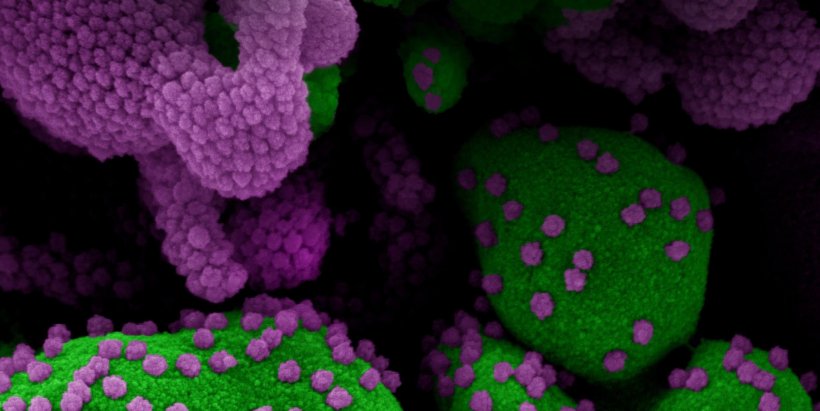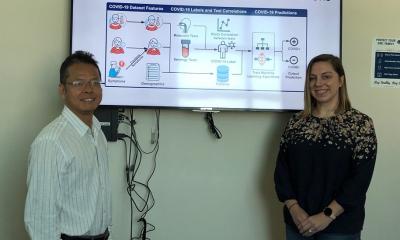News • Digital health
AI test rules out Covid-19 diagnosis within one hour
An Artificial Intelligence test has been shown to be able to rapidly screen patients arriving in Emergency Departments for Covid-19, using clinical information routinely available within the first hour of coming to hospital.
Image source: NIH Image Gallery from Bethesda, Maryland, USA, Novel Coronavirus SARS-Cov-2 (50011008502), marked as public domain, more details on Wikimedia Commons
Results of the CURIAL study, published in The Lancet Digital Health, show that the AI test correctly predicted the Covid-19 status of 92.3% of patients coming to Emergency departments at the John Radcliffe Hospital in Oxford and the Horton General Hospital in Banbury during a two-week test period. Compared against results of laboratory swab testing, the CURIAL AI screening test correctly ruled-out Covid-19 97.6% of the time. However, whereas swab testing typically takes 24 hours, the AI screening test offers rapid results using data that is already routinely available within one hour.
The screening test was developed by infectious disease and clinical machine learning experts at the University of Oxford. The research team is led by Dr Andrew Soltan, an NIHR Academic Clinical Fellow (Cardiology) at the John Radcliffe Hospital, joining with the AI for Healthcare lab of Professor David Clifton, within Oxford’s Institute of Biomedical Engineering, and with Professor David Eyre of the Oxford Big Data Institute.
Dr Andrew Soltan, also a researcher at Oxford University’s Radcliffe Department of Medicine, said: ‘Every day around 350 people come to our Emergency Departments in the John Radcliffe Hospital in Oxford and the Horton General Hospital in Banbury, yet only a small number will be ill with Covid-19. The CURIAL AI test offers clinical teams the potential to rapidly and confidently rule-out a diagnosis of Covid-19 for a large majority of the patients who do not have the infection, while identifying patients at higher risk of testing positive. The higher-risk patients can then be cared for in clinical areas with additional infection-control precautions while swab test results are awaited.’
The researchers developed the AI screening test using routine healthcare data (blood tests and vital signs) extracted from electronic health records for 115,394 patients and 72,310 admissions. Once developed, the two screening models were applied to all patients presenting or admitted to the John Radcliffe Hospital in Oxford and the Horton General Hospital in Banbury. The CURIAL AI model, screening for Covid-19 in all patients coming to the Emergency departments, was found to be 92.3% accurate when compared to the PCR test, while a specific model for patients admitted to the hospitals was 92.5% accurate. The models correctly excluded Covid-19 97.6% of the time for patients coming to ED, and 97.7% of the time for the patients admitted. The CURIAL screening test is therefore optimised to quickly give negative results with high confidence, safely excluding Covid-19 at the front door, and maintaining flow through the hospital.

Image source: NIH Image Gallery from Bethesda, Maryland, USA, Novel Coronavirus SARS-Cov-2 (50011008502), marked as public domain, more details on Wikimedia Commons
Dr Soltan said: ‘The turnaround time for Covid-19 swabs has come down since the start of the pandemic. However, until we have confirmation that patients are negative we must take additional precautions for patients with coronavirus symptoms, which are very common as we head in to winter. Patients screened by the AI test as low-risk could benefit from reduced delays to their care if we know sooner that they do not have Covid-19. A strength of our AI test is that it fits within the existing clinical care pathway and works with existing lab equipment. This means scaling it up will be relatively fast and cheap.’
Dr Ravi Pattanshetty, an A&E Consultant at the John Radcliffe Hospital supporting translation of the CURIAL into Emergency Departments, said: ‘The John Radcliffe Emergency Department will be conducting prospective validation of this AI tool in the coming months. We will be mainly using it to triage patients at the front door to help the flow of patients into various designated areas. We are very excited at the prospect of being able to use a tool which, should it prove successful, will help hospitals make more informed and rapid decisions with regards to patient flow. It has the potential to be tailored to be used in various scenarios.’
The researchers have now received an award from the University Medical and Life Sciences Translational Fund, comprising devolved funding from the Medical Research Council and Wellcome Trust, and are working with Infectious Diseases and Emergency Department teams at the John Radcliffe Hospital to trial the CURIAL AI test in the clinical pathway. A collaboration with University Hospitals Birmingham will allow the team to validate the AI test’s performance using data from a different NHS organisation.
This project is a great example of what can be done, and at very great pace, to fast-track the development of technologies to help in the current pandemic
David Clifton
The team are also validating a version of the CURIAL AI test that uses near-patient blood tests that can be performed in 10 minutes, reducing the time the AI needs to exclude coronavirus infection from one hour to only minutes. A trial to evaluate the near-patient AI screening model, named CURIAL-Rapide, is expected to begin shortly at the John Radcliffe Hospital in Oxford.
David Clifton, Professor of Clinical Machine Learning at the Department of Engineering Science, said: ‘With many of our clinical colleagues working on the front lines to fight Covid-19, data scientists in Healthcare AI have a supporting role to play by constructing tools to help care for patients. The unique ecosystem at Oxford between hospitals and clinical AI teams gives us a great opportunity to contribute to the international effort against Covid-19. This project is a great example of what can be done, and at very great pace, to fast-track the development of technologies to help in the current pandemic – and to increase the resilience of the country’s healthcare system for any future events.’
Source: University of Oxford
12.12.2020





